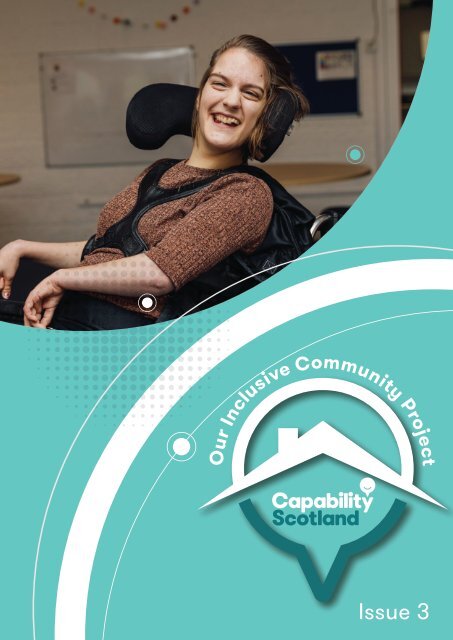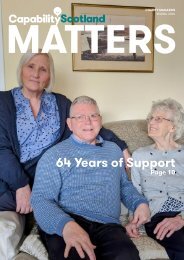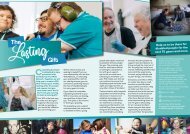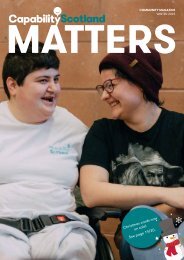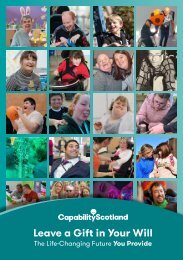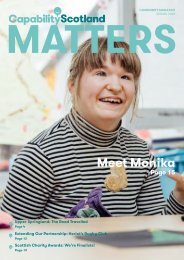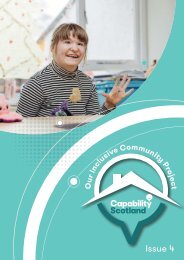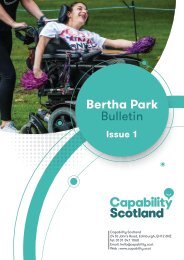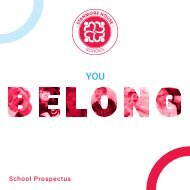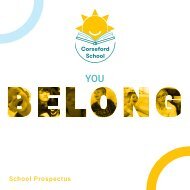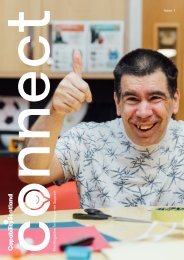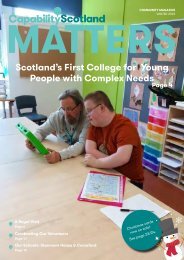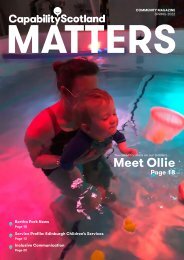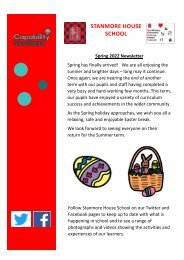Our Inclusive Community Project - Issue 3
Our Inclusive Community Project, previously the Bertha Park Bulletin, outlines Capability Scotland's ongoing plans to build a state of the art, new residential care home for disabled people in Perth. Issue 3 is out now!
Our Inclusive Community Project, previously the Bertha Park Bulletin, outlines Capability Scotland's ongoing plans to build a state of the art, new residential care home for disabled people in Perth. Issue 3 is out now!
- No tags were found...
You also want an ePaper? Increase the reach of your titles
YUMPU automatically turns print PDFs into web optimized ePapers that Google loves.
<strong>Issue</strong> 3
2 <strong>Our</strong> <strong>Inclusive</strong> <strong>Community</strong> Bulletin 3<br />
Welcome!<br />
Welcome to the third issue of <strong>Our</strong> <strong>Inclusive</strong><br />
<strong>Community</strong> <strong>Project</strong> Bulletin, formally known<br />
as the Bertha Park Bulletin, the newsletter<br />
that brings the latest updates on our plans<br />
to relocate from our Upper Springland site<br />
to a new, purpose-built site at the heart of<br />
the developing Bertha Park community, in<br />
Perth.<br />
Accessibility is<br />
Key<br />
We want to make sure these<br />
newsletters are accessible for you to<br />
read in a way you prefer. We’ve got a<br />
few versions ready to go but welcome<br />
any request for a different version. Get in<br />
touch if you need this in another format:<br />
hello@capability.scot<br />
So much has happened since our last<br />
update, firstly you will notice the change<br />
in project name. Until recently, we have<br />
referred to the relocation of Upper<br />
Springland as the Bertha Park <strong>Project</strong>,<br />
however this did not encapsulate what<br />
we want to achieve. It is our aim to build<br />
an inclusive community within our new<br />
site but also that, through the development<br />
of this project, we will create an inclusive<br />
community within Bertha Park and beyond.<br />
Hence why we have changed the project<br />
name to <strong>Our</strong> <strong>Inclusive</strong> <strong>Community</strong> <strong>Project</strong><br />
(OICP).<br />
In this issue we will update on:<br />
• overall programme summary<br />
• co-production and upcoming plans<br />
• MOBIE design challenge<br />
• our microsite
4 <strong>Our</strong> <strong>Inclusive</strong> <strong>Community</strong> Bulletin 5<br />
Overall Programme Summary<br />
So far in Stage 1, we have invested our time establishing the suitability<br />
of the land at Bertha Park, developed a financial model with high-level<br />
estimated costs, appointed an ethical funder, engaged a fundraising<br />
consultant, and built the mock-up studio flat to provide a focal point for our<br />
co-production activities.<br />
We are currently well established in Stage 2, working together on the<br />
service model and design that will create the foundations for the design<br />
statement, and ultimately the design brief, these will shape our site layout<br />
options. This will allow us to review our project budget and identify any<br />
potential shortfall to fundraise for.<br />
Once the design brief has been developed into layout options we will<br />
move into Stage 3 and secure the land area we need from the site already<br />
identified at Bertha Park next to the High School.<br />
In Stage 4 we will fully develop the way the studios and supporting<br />
facilities connect and, through our work with MOBIE, link with the local<br />
community. At Stage 5 it gets more technical as our design team converts<br />
everything agreed into a technical design and costed proposal. Stage 6 is<br />
where the contractor starts to build and, finally, on to Stage 7 where the<br />
buildings will be handed over. We will ensure the move happens in a careful<br />
and phased process.<br />
This indicative staged programme (see below) takes us to a completed<br />
project potentially at the end of 2026 or early 2027. The co-production<br />
process will continue throughout the design and service development<br />
processes and follow through to the operational phase.<br />
January 2022<br />
March 2023<br />
May 2024<br />
December 2026<br />
March 2022<br />
October 2023<br />
July 2025
6 <strong>Our</strong> <strong>Inclusive</strong> <strong>Community</strong> Bulletin 7<br />
Co-Production & Upcoming Plans<br />
The <strong>Inclusive</strong> <strong>Community</strong> <strong>Project</strong><br />
sets out, through a codesign and<br />
collaborative process, to deliver<br />
exemplar accommodation that aims<br />
to enable customers to have a greater<br />
quality of life, and more choices around<br />
establishing and fulfilling their personal<br />
goals, and the opportunities available<br />
to them. Co-production also fully<br />
recognises the unique relationship and<br />
understanding staff have with customers<br />
and harnessing their expertise to shape<br />
the future development of care provision<br />
and the design of the project is critical.<br />
We have been working with Architecture<br />
& Design Scotland (A&DS) over the<br />
last few months to develop a design<br />
statement for the new project. A&DS<br />
was set up in 2005 by the Scottish<br />
Government to champion good design<br />
and place-making.<br />
We had our first design statement<br />
workshops for customers, families and<br />
staff at Upper Springland in October.<br />
<strong>Project</strong> aspirations and critical success<br />
factors that have evolved so far from the<br />
co-production process were presented.<br />
We then workshopped and expressed the<br />
priorities and aspirations everyone had<br />
around specific design areas.<br />
The mock-up studio flat has been<br />
painted, with floor covering, accessible<br />
units and bathroom fittings currently<br />
being fitted. We have also started a<br />
review by the Allied Health team before<br />
trialling the latest toilet and body drier<br />
equipment. As part of our co-production<br />
work, we will be reviewing design-related<br />
factors and service ideas around:<br />
• bathrooms<br />
• living and communal areas<br />
• food services and kitchen facilities<br />
• transport services and transport links<br />
• laundry service and facilities<br />
• therapies service and facilities<br />
• day opportunities<br />
• external space<br />
• environmental controls in flats<br />
• environmental controls for wider<br />
building<br />
<strong>Our</strong> architects, AB&C, have been<br />
commissioned to understand and define<br />
the ‘Spectrum of Need and Ability’ of<br />
the existing customers and the working<br />
practices of staff. For customers,<br />
this includes understanding medical<br />
diagnosis, mobility, learning difficulties,<br />
environmental sensitivities, care/support<br />
requirements, equipment requirements,<br />
dietary requirements, communication<br />
methods, age, and length of residency.<br />
The architects spent several days at<br />
Upper Springland talking to customers<br />
and staff about what’s important in<br />
their daily routines, and what could<br />
be better within both the working and<br />
home environments. Plus they recorded<br />
direct feedback about the importance<br />
of therapies, activities, interactions with<br />
the wider community and the current<br />
service/ support systems.<br />
The learning from this process will be<br />
merged with information gathered from<br />
the design statement work and together<br />
will form the basis for a project design<br />
brief.<br />
Design Statement Workshop in full swing
8 <strong>Our</strong> <strong>Inclusive</strong> <strong>Community</strong> Bulletin 9<br />
MOBIE Design Challenge<br />
Pupils from Perth, together with Capability Scotland’s Corseford and<br />
Stanmore House Schools, have already started to unleash their creativity on<br />
the <strong>Inclusive</strong> <strong>Community</strong> <strong>Project</strong>, as part of the innovative MOBIE (Ministry<br />
of Building Innovation and Education) scheme, which is the brainchild of TV<br />
architect George Clarke.<br />
The MOBIE Challenge is around ideas that will forge strong and positive links<br />
between the growing Bertha Park development (3,000 new houses over the next<br />
20 years) and our new residential development, located adjacent to the newly<br />
completed Bertha Park High School.<br />
The Challenge was kicked off with an initial workshop in June.<br />
Representatives from Scottish Water were invited to start everyone thinking<br />
about the importance of saving water to get ideas “flowing.”<br />
Stephen Oswald, Capability Scotland’s <strong>Project</strong> Lead, said: “This was a brilliant<br />
start and the young people have amazing ideas about everything – quite<br />
simply their imaginations are unfettered.<br />
“We plan to be neighbours with the school, and we want to make sure we<br />
have the best possible relations and are part of a flourishing, inclusive and<br />
positive community. We are incredibly excited to see what the young people<br />
come up with over the next six months as part of their schoolwork and in future<br />
workshops.”<br />
Stephen added: “MOBIE will be challenging the pupils to produce ways<br />
to define what makes a community. For some that might be about being<br />
good neighbours, enjoying shared spaces, or creating new and positive<br />
opportunities.<br />
“Whatever it is, we can be assured there are going to be some colourful<br />
and creative ideas and no doubt lots of concepts that we can bring to life.<br />
Ultimately this is about making sure that our new development and the wider<br />
community are well connected.”<br />
While MOBIE aims to introduce young people to the value of careers in design,<br />
engineering and construction, Stephen hopes the process will also inspire<br />
pupils about the varied and rewarding career opportunities in the care sector.<br />
Bertha Park High School is the first completely new school built in Scotland<br />
for 25 years and has a capacity for 1,100 pupils, including 35 with additional<br />
support needs. It is one of 17 schools globally selected as a Microsoft Flagship<br />
School using advanced technology to enhance student learning.<br />
Gerry Ruffles, MOBIE’s Head of Education, said: “we need the younger<br />
generations to define how they want to live, learn, work and play now and<br />
in the future. MOBIE challenges are a launch pad for student creativity. This<br />
innovative project at Bertha Park provides a unique opportunity for our future<br />
designers and planners to share ideas and create a special, inclusive living<br />
and learning community.”<br />
MOBIE Workshop
10 <strong>Our</strong> <strong>Inclusive</strong> <strong>Community</strong> Bulletin 11<br />
New Microsite<br />
Over recent months we have been working on developing a microsite (a small<br />
website) dedicated to <strong>Our</strong> <strong>Inclusive</strong> <strong>Community</strong> <strong>Project</strong>. The site will act as an<br />
online hub for OICP, there will be regular updates posted on the development<br />
of the project as well as opportunities to have your say through online surveys<br />
and a live chat. The microsite is now live and can be visited at:<br />
https://oicp.capability.scot<br />
We would love to hear your feedback on the microsite, please get in touch<br />
through the contact us page or via the chat.
Capability Scotland delivers exemplary care,<br />
support, and education for disabled children<br />
and adults across Scotland.<br />
We were founded in 1946 and have always<br />
strived to be a major ally in supporting<br />
disabled people to have full equality of<br />
opportunity and participation as citizens of<br />
Scotland.<br />
Capability Scotland<br />
OICP, Upper Springland, Isla Road, Perth, PH2 7HQ<br />
Tel: 01738 632 995<br />
Email: hello@capability.scot<br />
Web : www.capability.scot<br />
Please get in touch on hello@capability.scot if you require this document in a different format.<br />
Limited by guarantee, registered in Scotland, number SC036524.<br />
Registered Scottish Charity, number SC011330


